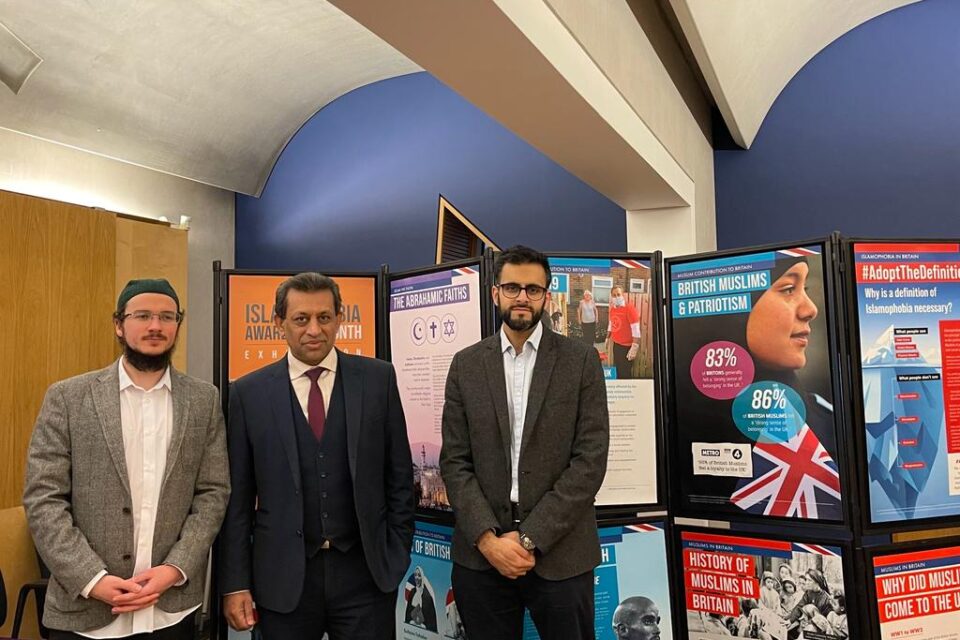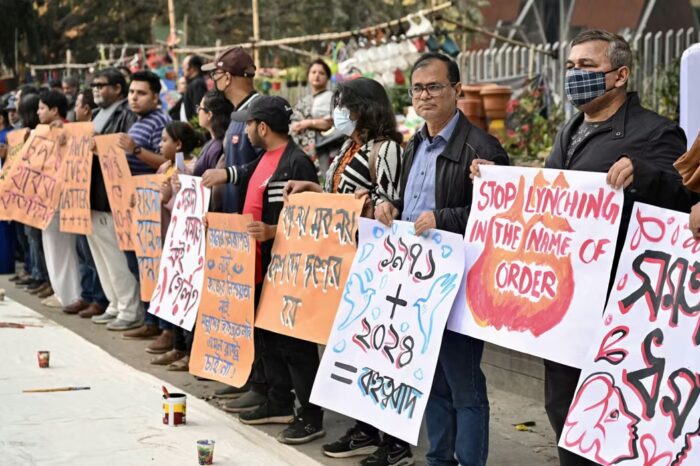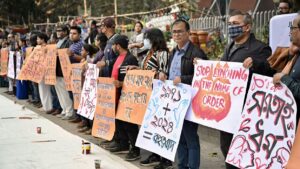30 Scottish organisations come together to urge local councils to adopt the APPG definition of Islamophobia

Foysol Choudhury MSP with the MEND team
30 Scottish organisations have signed an open letter calling on all local councils in Scotland to urgently adopt the APPG definition of Islamophobia and accompanying guidelines put forward by the Coalition Against Islamophobia.
The APPG definition of Islamophobia states, “Islamophobia is rooted in racism and is a type of racism that targets expressions of Muslimness or perceived Muslimness.”
The letter has been sent to the leaders of all 32 Scottish councils and its signatories include a range of Muslim organisations and mosques, as well as other religious and human rights organisations, such as:
- MEND (Muslim Engagement and Development)
- Central Scotland, West of Scotland, and Edinburgh and Lothian Regional Equality Councils
- Edinburgh Central Mosque
- AMINA Muslim Women’s Resource Centre
In the letter, the organisations highlight the worrying rise of Islamophobia in Scotland and that councils have a statutory duty, as per the Equality Act 2010, to advance equality of opportunity for communities with a protected characteristic, such as Muslims.
Indeed, the 2021 Islamophobia public inquiry by the Scottish Parliament’s Cross-Party Group on Tackling Islamophobia found that:
- 83% of respondents have experienced Islamophobia directly;
- 75% of respondents see Islamophobia as a regular or everyday issue in Scottish society;
- 78% of respondents believe Islamophobia is a growing problem in Scotland.
The letter concluded that adopting a formal definition of Islamophobia “is a fundamental first step all councils must take to tackle the critical issue of Islamophobia in a targeted and effective manner.”
Jawad Khursheed, MEND Scotland Chair, said,“Having an official definition of Islamophobia is essential to tackling this appalling form of racism. Councils have a responsibility to adopt the APPG definition to show that they will not tolerate Islamophobia and are standing against the hardships faced by Scottish Muslim communities, including their own.”
Why a definition of Islamophobia is important:
- It is the starting point in tackling the issue because we can only tackle Islamophobia effectively if we know what it means and entails.
- A formal definition of Islamophobia will allow policymakers to identify how Islamophobia manifests itself and functions and therefore, devise meaningful strategies to tackle it.
- Adopting the definition signifies allyship – that the hardships being faced by Scottish Muslim communities are being recognised and that combatting Islamophobia is a priority.
MEND also ran an Islamophobia Awareness Month during November 2022. Foysol Choudhury MSP, who was a part of this campaign said, “Islamophobia and other religious and racial hatred is a stain on our society that needs washing out urgently.
“The theme this Islamophobia Awareness Month was tackling denial: tackling the denial that Islamophobia exists in Scotland and tackling the denial about the effect it can have on recipients of Islamophobic abuse.
“I tried to encourage all my constituents this month to speak out when they experienced abuse, or saw it being perpetrated.
“By raising awareness that these problems exist, we can all support each other, encourage more victims to speak out and inform parliamentarians and law officials about what constituents are facing daily.
“I know from an event I attended with the organisation MEND that many victims of Islamophobia feel unable to raise this issue with their MSPs, whether this be due to worry about the consequences, a lack of supportive access to MSPs or language barriers.
“MEND can offer you support on these issues and help you to reach out to parliamentarians, so I would encourage those struggling to contact them.
“I was glad to see that Islamophobia Awareness Month also coincided with Interfaith Week.
“Religious hatred and intolerance affects all and so I believe that religions should be working together to foster peaceful relations and end abuse such as Islamophobia and Antisemitism.
“By working together and joining each others’ celebrations, we can learn more about our differences and be unified it our common aims of equality and peace.
“It was also interesting to learn during Islamophobia Awareness Month that many Islamophobic attacks are also carried out against those who aren’t even Muslim.
“For example, I heard of a Sikh man who was a victim of Islamophobic attack because the attacker mistook him for a Muslim.
“These forms of Islamophobia also have a devastating effect on recipients of the abuse and we must develop more robust reporting and monitoring frameworks for hate crime so that these intricacies can be better understood and better support can be given to victims.
“Whilst this Islamophobia Awareness Month has brought many saddening factors to light about how far we have to go until we live in an Islamophobia free world, it has also highlighted the positive impact of how we can work together to provide each other with support and hopefully end religious intolerance and abuse once and for all.
“If I could give everyone one takeaway this Islamophobia Awareness Month, it would be to speak out about Islamophobia, provide support for religious communities and work with all to create a better, more tolerant and peaceful world.”








